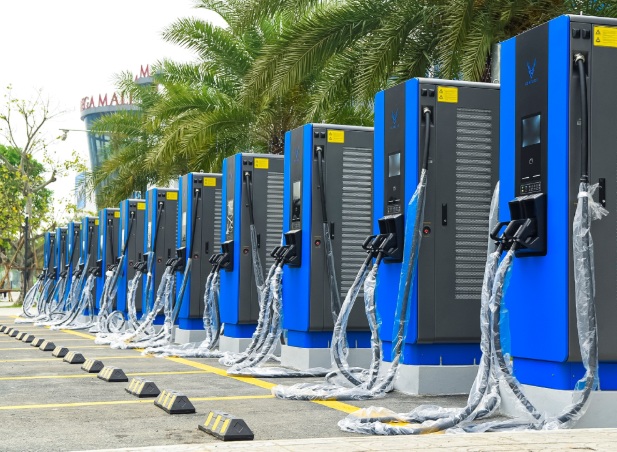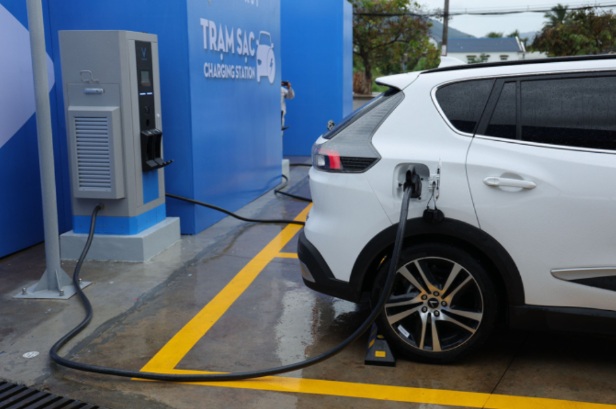The Ministry of Science and Technology is in the process of promulgating National Technical Regulations (QCVN) for electric vehicle charging stations to ensure safety, standardize infrastructure, and promote the transition to green transportation.
At a regular press conference, the Ministry of Science and Technology announced that they are in the process of finalizing the draft QCVN for electric vehicle charging stations. Mr. Ha Minh Hiep, Chief of Office of the Ministry of Science and Technology, stated that the rapid development of the electric vehicle market in Vietnam demands a corresponding charging infrastructure and a legal framework to better manage the existing charging stations and pillars.
The draft QCVN is developed based on international experiences, existing technical regulations, and a practical survey of production, import, business, and testing units of charging pillars in the North, Central, and South regions. The Ministry of Science and Technology has also coordinated with the Ministry of Industry and Trade to gather feedback from ministries, sectors, localities, and businesses before the official promulgation.
Unlike technical standards, which are voluntary, national technical regulations are mandatory legal documents. The limits set in the QCVN aim to protect public health, social safety, and the environment. Any violation of these regulations will be subject to penalties under the law.
Previously, the Ministry of Science and Technology announced 23 National Standards (TCVN) related to charging pillars and stations, including requirements for electrical safety, electromagnetic compatibility, communication between the pillar and the vehicle, cables, plugs, circuit breakers, and electrical measuring equipment. These standards are equivalent to international standards such as ISO, IEC, and EC/ECE/EU regulations.
To establish the system of standards and regulations, the Ministry of Science and Technology established technical committees with the participation of representatives from management agencies, domestic and foreign enterprises, associations, experts, and universities, operating according to the ISO model and ensuring compliance with international practices.
According to industry experts, the promulgation of QCVN for electric vehicle charging stations is a fundamental step in building a green transportation ecosystem in Vietnam. Currently, many enterprises have proactively installed their own charging systems. However, the lack of technology standardization and consistency has created a fragmented situation, causing inconvenience to users and potential safety hazards, especially regarding high voltage, connectivity, and fire prevention.
With the implementation of QCVN, charging pillars will have to comply with unified technical criteria, ranging from operational safety to compatibility with different electric vehicle models. This will help establish a stable charging infrastructure market and open up opportunities to adopt advanced international charging technologies, rather than being limited to proprietary or closed systems.
While the QCVN brings significant benefits, it also poses challenges for businesses that have already invested in charging systems based on their own standards. Upgrading or replacing infrastructure to comply with the new requirements may incur considerable costs. Additionally, the uneven electrical infrastructure in many localities, especially in rural and mountainous areas, can hinder the large-scale deployment of charging stations.
However, for consumers, this is a positive development. Standardized charging pillars ensure safety, enhance convenience, and build trust in the transition to green transportation. In the long run, a consistent infrastructure can lead to a “charge anywhere” model, as seen in developed countries, thereby eliminating range anxiety associated with electric vehicles.
To ensure the effective implementation of QCVN, experts recommend a suitable roadmap that provides businesses with time to adjust and adapt. Additionally, the government can consider support mechanisms such as tax incentives, credit privileges, or investment subsidies for entities deploying standardized charging infrastructure, especially in areas with low commercial appeal but high importance in popularizing electric vehicles.
“V-Green and VietinBank Collaborate to Develop EV Charging Infrastructure.”
“V-Green, a leading provider of electric vehicle charging solutions, and VietinBank, one of Vietnam’s largest commercial joint-stock banks, have joined forces to accelerate the development of EV charging infrastructure across the nation. Through this strategic partnership, the two entities aim to offer tailored credit solutions to bolster the deployment of EV charging stations, thereby fostering the adoption of electric vehicles and contributing to a greener and more sustainable Vietnam.”















































